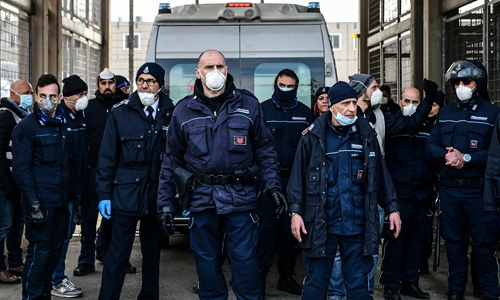HOME >> OPINION
Coronavirus a severe test of EU’s solidarity
By He Zhigao Source:Global Times Published: 2020/3/12 14:48:40

Prison officers stand guard after an ambulance (rear) entered the Sant'Anna prison during a protest from inmates' relatives in Modena, Emilia-Romagna, in one of Italy's quarantine red zones on Monday. Inmates in four Italian prisons have revolted over new rules introduced to contain the coronavirus outbreak, leaving one prisoner dead and others injured, a prison rights group said on Saturday. Photo: AFP
The coronavirus outbreak is spreading throughout Europe, reminding people of the Middle Ages when the Black Death wreaked havoc across the continent. Although the healthcare systems in Europe are much more advanced, this epidemic will test the continent's solidarity and EU's governing capacity.Europe should have plenty of time to prepare for the outbreak, as China's all-out efforts to fight the virus bought it valuable time and provided experience the world can learn from. However, many countries still have a leaving-things-to-chance attitude, resulting in the rapid spread of the virus over almost all European states.
European countries can't be expected to adopt whole-of-government and whole-of-society approaches, so they have only taken moderate prevention and control steps. Europe's defenses against the disease are limited by its risk assessment philosophy and governance structure - including administrative capacity, medical resources and the public's willingness to cooperate with governments.
The number of coronavirus infections in Europe is on the rise. Across Europe, the number of confirmed infections surpassed 22,000 on Wednesday, with the number of cases in Italy reaching more than 12,000. The World Health Organization on Wednesday declared the rapidly spreading coronavirus outbreak a pandemic.
In public health, the EU only plays a complementary role. The European Commission can provide support to its member states in responding to crises and offer advice on a common course of action.
On January 28, Croatia, as chair of the rotating EU presidency, activated the integrated political crisis response mechanism to support information exchanges between the bloc and member states. The mechanism was further escalated into full-activation mode on March 2.
The European Commission also activated the ARGUS crisis coordination mechanism to establish a crisis coordination committee, and pledged 232 million euros ($263 million) in funding to tackle the outbreak.
An emergency meeting was held in Brussels, Belgium on March 6, where health ministers from EU member states tried to boost coordinated decision-making over the coronavirus.
As stipulated by the solidarity clause, EU members are obliged to "provide assistance to another EU country which is the victim of a natural or man-made disaster." Member countries can coordinate with each other within the EU framework, giving each state relatively greater power to deal with the crisis. Most European countries have well-functioning disease warning and reporting systems and well-established prevention and control plans for epidemic diseases. However, gaps exist in healthcare funding and quality among EU countries.
EU members are dealing with public health issues in their own ways. Italy has taken emergency measures to restrict the movement of people throughout the country. This is an experience learned from China and a responsible move not only for Europe, but also for the world. Other countries also adopted strict measures to fight the epidemic, such as shutting down schools, banning large-scale gatherings and suspending flights to Italy. But the focus of their work is epidemic prevention and control on their own soil, rather than coordinated measures between states.
How much assistance Italy will receive from the EU to fight the virus is still unknown. Medical and healthcare information involves national security. Information sharing among member states is thus difficult. Europe is also facing shortages of medical equipment and resources, and insufficient budgets. The European Commission regards the epidemic as a risk to the bloc's economy. How it strikes a balance between protecting the economy and epidemic control will test the EU's solidarity.
It remains to be seen whether COVID-19 will end up promoting further integration of European health systems, but solidarity and collaboration are essential to addressing global common threats, including the outbreak of the novel coronavirus.
The author is a research fellow with the Institute of European Studies, Chinese Academy of Social Sciences. opinion@globaltimes.com.cn
Posted in: VIEWPOINT